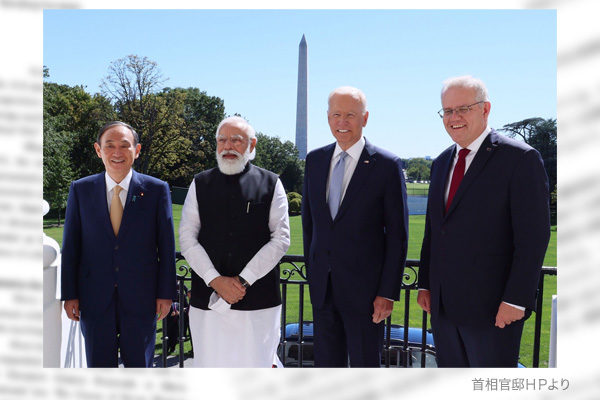Japan, the United States, Australia and India held their first-ever face-to-face leaders’ summit for the Quadrilateral Security Dialogue, or the Quad, in Washington on September 24. In a bid to counter autocratic China, the four major Indo-Pacific democracies in their joint statement launched the direction of their cooperation that focused on addressing non-traditional threats such as the novel coronavirus and climate change, economic security including the development of emerging technologies, infrastructure building in developing countries and other non-military fields. A matter of concern is that Japanese politicians are little interested in the strategic significance of the Quad.
Focusing on non-military cooperation
The summit made two noteworthy achievements from a standpoint of the Quad evolution. First, the four leaders agreed to hold a summit annually. As the annual summit is added to an annual meeting of foreign ministers, the Quad takes the form of an established multilateral organization.
Second, the Quad leaders announced various specific policies to cooperate in non-military fields in addition to the production and distribution of novel coronavirus vaccines for developing countries as agreed on at their online summit in March. Most of the policies keep China in mind. For instance, the Quad infrastructure cooperation in developing countries will fall in line with the Group of Seven (G7) industrial democracies’ “Build Back Better World” (B3W) scheme to counter China’s Belt and Road Initiative.
Under Quad vaccine cooperation to rival China’s vaccine diplomacy, India as a major vaccine-producing country will resume vaccine exports to developing countries in October as its explosive coronavirus infection spread calms down after forcing the exports to be suspended.
Even though non-military fields are likely to be a major part of Quad cooperation, Japan, the United States, Australia and India carried out joint Malabar naval exercise in August and September that included anti-submarine warfare drills. The latest exercise that followed the previous one in November 2020 indicated the purpose of the Malabar exercise is not limited to Humanitarian Assistance/Disaster Relief to prepare for great tsunami waves and other disasters. The joint statement of the Quad leaders for the latest summit renewed their vow “to meet challenges to the maritime rules-based order, including in the East and South China Seas.”
Just before the Quad summit, however, the United States, the United Kingdom and Australia launched the new AUKUS security framework to provide Australia with U.S. and U.K. nuclear submarine technology. As the AUKUS focuses on military cooperation, the Quad’s military role may become limited.
Blocking China-led international order
The Quad, even if focusing on non-military cooperation, remains significant as an organization of democracies to block China from realigning world order. Both the Quad and “Free and Open Indo-Pacific” driven by the Quad have been initiated by former Japanese Prime Minister Shinzo Abe. Incumbent Prime Minister Yoshihide Suga has basically taken over the Abe diplomacy. In campaigns for the ruling Liberal Democratic Party’s presidential election to select a successor to Suga as prime minister, however, there was regrettably little discussion about the Quad or the Indo-Pacific strategy.
As the Quad has evolved into a multilateral organization to hold an annual summit and has been established as a framework to check China, the next prime minister of the country that created the Quad will be internationally responsible for seeking further evolution of the Quad.
Yasushi Tomiyama is a senior research fellow and Planning Committee member at the Japan Institute for National Fundamentals and a former foreign news editor and bureau chief in Washington, D.C., London and Bangkok for the Jiji Press.


